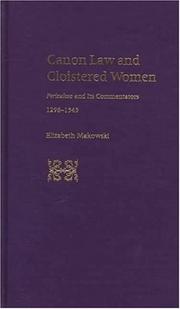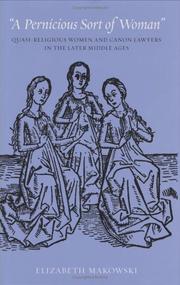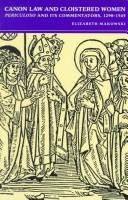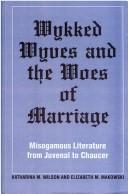| Listing 1 - 8 of 8 |
Sort by
|

ISBN: 081320884X 9780813208848 0813209498 9780813209494 Year: 1997 Volume: 5 Publisher: Washington (D.C.) : Catholic university of America press,
Abstract | Keywords | Export | Availability | Bookmark
 Loading...
Loading...Choose an application
- Reference Manager
- EndNote
- RefWorks (Direct export to RefWorks)
Convents (Canon law) --- Monasticism and religious orders for women (Canon law) --- Nuns --- Monasticism and religious orders for women --- History. --- History --- -Monasticism and religious orders for women (Canon law) --- -Nuns --- -Monasticism and religious orders for women --- Women in Christianity --- Convents --- Sisterhoods --- Sisters (in religious orders, congregations, etc.) --- Christians --- Canon law --- Catholic Church --- Nunnor --- Frauenorden --- Kanonisches Recht --- Convents (Canon law). --- Monasticism and religious orders for women (Canon law). --- Nuns. --- kanonisk rätt --- Middle Ages. --- Liber sextus --- Periculoso --- Geschichte 1298-1545. --- 600-1500. --- Frauenorden. --- Kanonisches Recht. --- Periculoso. --- -History --- Nuns (Canon law) --- Catholic Church. --- Convents (Canon law) - History. --- Monasticism and religious orders for women (Canon law) - History. --- Nuns - History. --- Monasticism and religious orders for women - History - Middle Ages, 600-1500.
Book
ISBN: 1843837862 9781843837862 9781782040521 1782040528 1283836556 Year: 2011 Publisher: Suffolk Boydell & Brewer
Abstract | Keywords | Export | Availability | Bookmark
 Loading...
Loading...Choose an application
- Reference Manager
- EndNote
- RefWorks (Direct export to RefWorks)
In late medieval England, cloistered nuns, like all substantial property owners, engaged in nearly constant litigation to defend their holdings. They did so using attorneys (proctors), advocates and other 'men of law' who actually conducted that litigation in the courts of Church and Crown. However, although lawyers were as crucial to the economic vitality of the nunneries as the patrons who endowed them, their role in protecting, augmenting or depleting monastic assets has never been fully investigated. This book aims to address the gap. Using records from the courts of the common law, Chancery, and a variety of ecclesiastical venues, it examines the working relationships without which cloistered nuns could not have lived in fully enclosed but self-sustainingc communities. In the first part it looks at the six mendicant and Bridgettine houses established in England, and relates the effectiveness and resilience of their cloistered spirituality to the rise of legal professionalism in the twelfth and thirteenth centuries. It then presents cases from ecclesiastical and royal courts which illustrate the work of legal professionals on behalf of their clients. Elizabeth Makowski is Ingram Professor of History, Texas State University.
Canonists --- Canonists. --- Convents (Canon law) --- Convents (Canon law). --- Frauenorden. --- Monasticism and religious orders (Canon law) --- Monasticism and religious orders (Canon law). --- Monasticism and religious orders for women --- Nuns (Canon law) --- Nuns (Canon law). --- Rechtsbeistand. --- Religion and law --- Religion and law. --- History --- Middle Ages. --- To 1500. --- England. --- 271-055.2 "04/14" --- 271-055.2 <420> --- Vrouwelijke religieuze orden, congregaties--Middeleeuwen --- Vrouwelijke religieuze orden, congregaties--Engeland --- 271-055.2 <420> Vrouwelijke religieuze orden, congregaties--Engeland --- 271-055.2 "04/14" Vrouwelijke religieuze orden, congregaties--Middeleeuwen --- Law --- Nuns --- Sisters (in religious orders, congregations, etc.) --- Christians --- Canon law --- Women in Christianity --- Convents --- Sisterhoods --- Acts, Legislative --- Enactments, Legislative --- Laws (Statutes) --- Legislative acts --- Legislative enactments --- Jurisprudence --- Legislation --- Legal status, laws, etc --- Catholic Church --- Law and religion --- Canon lawyers --- Lawyers --- Religious aspects --- Cloistered nuns. --- Ecclesiastical courts. --- Legal professionalism. --- Legal professionals. --- Medieval England. --- Mendicant houses. --- Monastic assets.
Multi
ISBN: 9781783274260 9781787445802 Year: 2019 Publisher: Woodbridge The Boydell Press
Abstract | Keywords | Export | Availability | Bookmark
 Loading...
Loading...Choose an application
- Reference Manager
- EndNote
- RefWorks (Direct export to RefWorks)
To make a vow is a matter of the will, to fulfill one is a matter of necessity, declared late medieval canon law, and religious profession involved the most solemn of those vows. Professed nuns could never renege on their vows and if they did attempt to re-enter secular society, they became apostates. Automatically excommunicated, they could be forcibly returned to their monasteries where, should they remain unrepentant, penalties, including imprisonment, might be imposed. And although the law imposed uniform censures on male and female apostates, the norms regarding the proper sphere of activity for women within the Church would prohibit disaffected nuns from availing themselves of options short of apostasy that were readily available to monks similarly unhappy with the choices that they had made. This book is the first to address the practical and legal problems facing women religious, both in England and in Europe, who chose to reject the terms of their profession as nuns. The women featured in these pages acted, and were acted upon, by the law: the volume shows alleged apostates petitioning for redress and actual apostates seeking to extricate themselves, via self-help and litigation, from the moral and legal consequences of their behaviour.
Ex-nuns. --- Ex-religieuses. --- Femmes --- Ex-church members --- Women --- Women in the Catholic Church --- Femmes et Église catholique --- Catholic Church. --- History --- Christian church history --- anno 500-1499 --- United Kingdom --- Femmes et Église catholique
Book
ISBN: 1787445801 1783274263 Year: 2019 Publisher: Suffolk : Boydell & Brewer
Abstract | Keywords | Export | Availability | Bookmark
 Loading...
Loading...Choose an application
- Reference Manager
- EndNote
- RefWorks (Direct export to RefWorks)
A study of women who left their nunneries: their motives and actions, and the consequences for them.
Monasticism and religious orders for women --- Nuns (Canon law) --- Convents (Canon law) --- Canon law --- Women in Christianity --- Convents --- Nuns --- Sisterhoods --- History --- Catholic Church

ISBN: 0813216222 9780813216225 0813213924 9780813213927 Year: 2005 Publisher: Washington, D.C. Catholic University of America Press
Abstract | Keywords | Export | Availability | Bookmark
 Loading...
Loading...Choose an application
- Reference Manager
- EndNote
- RefWorks (Direct export to RefWorks)
Monasticism and religious orders for women (Canon law) --- Third orders --- History
Digital
ISBN: 9781782040521 Year: 2011 Publisher: Suffolk Boydell & Brewer
Abstract | Keywords | Export | Availability | Bookmark
 Loading...
Loading...Choose an application
- Reference Manager
- EndNote
- RefWorks (Direct export to RefWorks)

ISBN: 0813210607 9780813210605 0813209498 081320884X 9780813208848 Year: 1997 Publisher: Washington, D.C. Catholic University of America Press
Abstract | Keywords | Export | Availability | Bookmark
 Loading...
Loading...Choose an application
- Reference Manager
- EndNote
- RefWorks (Direct export to RefWorks)

ISBN: 0585068836 9780585068831 079140062X 1438424191 9781438424194 Year: 1990 Publisher: Albany, NY State University of New York Press
Abstract | Keywords | Export | Availability | Bookmark
 Loading...
Loading...Choose an application
- Reference Manager
- EndNote
- RefWorks (Direct export to RefWorks)
The distrust and hatred of matrimony is a recurring theme in Western literature. In this volume, the authors show that in their repeated imagery, continuous themes, and rhetorical devices, misogamous texts closely parallel and reflect economic and demographic shifts, and theological and legal innovation. Analysis of the literature demonstrates a link between the growing secularism and careerism of the late middle ages and the reduction of women's social status and public options.
Literature, Medieval --- Satire, Medieval --- Marriage customs and rites, Medieval. --- Marriage in literature. --- Misogyny in literature. --- Wives in literature. --- Women in literature. --- Woman (Christian theology) in literature --- Women in drama --- Women in poetry --- Medieval marriage customs and rites --- Medieval satire --- History and criticism. --- Juvenal --- Giovenale, D. Giunio --- Juvenalis, Decimus Junius --- Juvénal --- Influence. --- Marriage customs and rites, Medieval --- Marriage in literature --- Misogyny in literature --- Wives in literature --- Women in literature --- 82.04 --- 82:396 --- 82:396 Literatuur en feminisme --- Literatuur en feminisme --- 82.04 Literaire thema's --- Literaire thema's --- History and criticism --- Iuvenalis, Decimus Iunius --- Iuvenalis, Decimus Junius --- Giovenale --- Iouvenalēs --- I︠U︡venal, D. I︠U︡nīĭ --- Yuvenalis --- Giovenale, Decimo Giunio
| Listing 1 - 8 of 8 |
Sort by
|

 Search
Search Feedback
Feedback About UniCat
About UniCat  Help
Help News
News